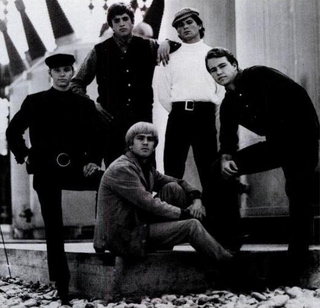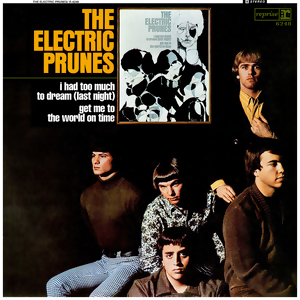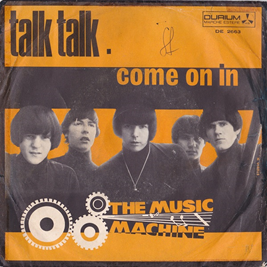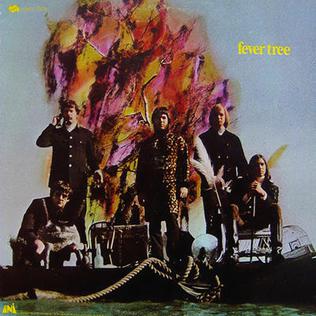
The Electric Prunes are an American psychedelic rock band, formed in Los Angeles, California, in 1965. Much of the band's music was, as music historian Richie Unterberger described it, possessed of "an eerie and sometimes anguished ambiance." Their most successful material was by songwriters Annette Tucker and Nancie Mantz, though the group also penned their own songs. Incorporating psychedelia and elements of embryonic electronic rock, the band's sound was marked by innovative recording techniques with fuzz-toned guitars and oscillating sound effects. In addition, guitarist Ken Williams' and singer James Lowe's concept of "free-form garage music" provided the band with a richer sonic palette and exploratory lyrical structure than many of their contemporaries.

The Beau Brummels was an American rock band. Formed in San Francisco in 1964, the band's original lineup included Sal Valentino, Ron Elliott, Ron Meagher, Declan Mulligan, and John Petersen (drums). They were discovered by local disc jockeys who were looking to sign acts to their new label, Autumn Records, where Sylvester Stewart—later known as Sly Stone—produced the group's early recording sessions. Initially, the band's musical style blended beat music and folk music and typically drew comparisons to the Beatles, while their later work incorporated other music genres such as psychedelic rock and country rock.

The Music Machine was an American rock band formed in Los Angeles, California in 1966. Fronted by chief songwriter and lead vocalist Sean Bonniwell, the band cultivated a characteristically dark and rebellious image reflected in an untamed musical approach. Sometimes it made use of distorted guitar lines and hallucinogenic organ parts, punctuated by Bonniwell's distinctively throaty vocals. Although they managed to attain national chart success only briefly with two singles, the Music Machine is today considered by many critics to be one of the groundbreaking acts of the 1960s. Their style is now recognized as a pioneering force in proto-punk; yet within a relatively short period of time, they began to employ more complex lyrical and instrumental arrangements that went beyond the typical garage band format.

Thomas Harvey "Sean" Bonniwell was an American singer-songwriter/guitarist, who was known as the creative force behind the 1960s garage rock band, The Music Machine.

"Hey Joe" is an American song from the 1960s that has become a rock standard and has been performed in many musical styles by hundreds of different artists. The lyrics tell of a man who is on the run and planning to head to Mexico after shooting his unfaithful wife. In 1962, Billy Roberts registered "Hey Joe" for copyright in the United States.

The Leaves were an American garage rock band formed in the San Fernando Valley, California, in 1964. They are best known for their version of the song "Hey Joe", which was a hit in 1966. Theirs is the earliest release of this song, which became a rock standard.

Underground is the second studio album by the American garage rock band, The Electric Prunes, and was released in 1967 on Reprise Records. It would be the final album of any materialized input by band members until the 1969 "New Improved" Electric Prunes were formed. The album was a moderate chart hit, but, without a hit-ready single, the band could not repeat their past success.

"Shapes of Things" is a song by the English rock group the Yardbirds. With its Eastern-sounding, feedback-laden guitar solo and environmentalist, anti-war lyrics, several music writers have identified it as the first popular psychedelic rock song. It is built on musical elements contributed by several group members in three different recording studios in the US, and was the first Yardbirds composition to become a record chart hit; when released as a single on 25 February 1966, the song reached number three in the UK and number eleven in the US.
The Litter was an American psychedelic and garage rock band, formed in 1966 in Minneapolis, Minnesota, United States. They are best remembered for their 1967 debut single, "Action Woman". The group recorded three albums in the late 1960s before disbanding, but they re-united in 1990, 1992, and again in 1998, when they recorded a new studio album consisting of both old and new material. All of their Minneapolis recorded material was produced by Warren Kendrick, who owned the Scotty and Warick and Hexagon labels.

The Electric Prunes, sometimes referred to as I Had Too Much to Dream (Last Night), is the 1967 debut album by the American garage rock band, the Electric Prunes, released on Reprise Records. The first track, "I Had Too Much to Dream (Last Night)", was a hit and became the band's signature tune. The album also contains another notable psychedelic rock composition, "Get Me to the World on Time". The album was listed in the book 1001 Albums You Must Hear Before You Die.

"Who Do You Love?" is a song written by American rock and roll pioneer Bo Diddley. Recorded in 1956, it is one of his most popular and enduring works. The song represents one of Bo Diddley's strongest lyrical efforts and uses a combination of hoodoo-type imagery and boasting. It is an upbeat rocker, but the original did not use the signature Bo Diddley beat rhythm.

"Talk Talk" is the debut single of American garage rock band the Music Machine. It was released in November 1966, and produced the band's only Top 20 hit on the Billboard Hot 100. The song was included on their debut album, (Turn On) The Music Machine.

No Way Out is the debut album by the American garage rock band The Chocolate Watchband, and was released in September 1967 on Tower Records. It blended both garage and psychedelic rock influences, and was marked by distorted guitar instrumentals that were early examples of protopunk. It features the band's harder-edged interpretations of songs, with only three original compositions. The album was preceded by two non-album singles, "Sweet Young Thing" and "Misty Lane", and track singles, "No Way Out" and "Are You Gonna be There ". However, none of the singles managed to chart. Like its singles, No Way Out failed to reach the Billboard 200, but it established the group as a popular live act, and later became noted as a garage rock classic.

Close is a solo album by American rock musician Sean Bonniwell, credited under the moniker T. S. Bonniwell, who had been the creative force behind the innovative garage rock band The Music Machine. The album was released on August 4, 1969, by Capitol Records. It marked a total departure from Bonniwell's rebellious protopunk period with The Music Machine, to a soft rock crooning style. In addition, the album blended folk rock and orchestrated influences, and was inspired by Bonniwell's stints in the pre-Music Machine groups, the Wayfarers and the Ragamuffins, along with his desire to be more poetically inclined. The song,"Where Am I to Go", was released as a single ahead of the album, but failed to chart. Like its attendant single, Close was also somewhat commercially unsuccessful, and was the last recording by Bonniwell for the next 20 years.

Apple Pie Motherhood Band was an American psychedelic rock band formed in Boston, Massachusetts, in 1967. One of the several groups involved in the "Bosstown Sound", a commercial ploy designed to compete with the San Francisco Sound, the band developed a blend of psychedelia, blues rock, and hard rock, which was exemplified and expanded upon on their two albums. The group went through several line-up changes before disbanding in 1970.

Fever Tree is the debut studio album by the American psychedelic rock band Fever Tree and was released on March 28, 1968 on Uni Records. It blended multiple influences ranging from psychedelia to baroque pop and folk rock, and was marked by eerie ballads and hard rock numbers. Much of the group's material was penned by the husband-wife songwriting duo of Scott and Vivian Holtzman, along with renditions of contemporary rock songs. The album was preceded by arguably Fever Tree's best known song, "San Francisco Girls ", becoming the group's only nationally charting single. Like its attendant single, Fever Tree was also moderately successful and managed to reach number 156 on the Billboard 200.
"The People in Me" is a song by the American garage rock band the Music Machine, written by Sean Bonniwell, and first released as a track on their debut studio album (Turn On) The Music Machine in December 1966 on Original Sound Records.

Ignition is a compilation album by the American garage rock band, The Music Machine, and was released on June 27, 2000 on Sundazed Records. It includes an assortment of rare singles, outtakes, and previously unreleased material spanning from when the group went under the moniker, the Raggamuffins, in 1965, to their disbandment in 1969. The Raggamuffins were a folk rock trio led by Sean Bonniwell, and the prototype group that developed an experimental hard-edge sound, before recruiting two additional members and becoming the Music Machine. By 1969, all the original members, except Bonniwell, departed the group, which was then known as the Bonniwell Music Machine. Though the band would no longer produce hits, such as "Talk Talk" and "The People In Me", it was Bonniwell's most ambitious recording period as he incorporated elements of psychedelia and pop rock into the group's music.

The Bonniwell Music Machine is the second and final album by the American garage rock band, The Music Machine, recorded under the renamed moniker, The Bonniwell Music Machine, and released on Warner Bros. Records, on February 10, 1968. As with their debut LP, the album again saw the band blending garage and psychedelic rock influences, albeit with a greater emphasis on psychedelia than on their previous album release. Prior to completing its recording, all of the group's original members, except for its creative force, Sean Bonniwell, departed, though they would still appear on some of the album's tracks.

"Action Woman" is a song by the American garage rock band the Litter, written by their record producer Warren Kendrick, and first released as the group's debut single on Scotty Records in January 1967. The song also appeared on the band's first album Distortions. Although "Action Woman" never broke out on the national charts, it is now revered as a classic piece of the musical genre of garage rock. Accordingly, the composition has appeared on several compilation albums – most famously as the opening track on Pebbles, Volume 1, incorporating a skip in the recording – and has been the subject of cover versions.


















